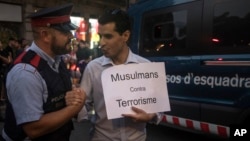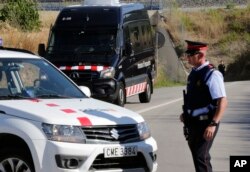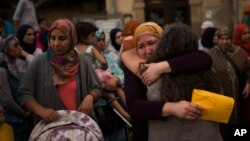Four suspects arrested in connection with last week’s deadly van attack in Barcelona are scheduled to appear in court Tuesday, a day after police shot and killed the man they say was the van’s driver.
Authorities say a 12-man terror cell was behind the attack, and that eight of the suspects have either been killed by police or died in an accidental explosion at their bomb-making facility the day before the attack.
The massive manhunt for the last outstanding suspect, Younes Abouyaaqoub, ended Monday in a rural area known for its vineyards about 45 kilometers west of Barcelona. Authorities say they shot the fugitive after he held up what appeared to be a bomb belt, which they later discovered was fake.
“We confirm that the man shot dead in #subirats is Younes Abouyaaqoub, author of the terrorist attack in #barcelona,” police tweeted Monday.
Catalan Interior Minister Joaquim Forn told Catalunya radio that “everything indicates” Younes Abouyaaqoub was behind the wheel of the van during Thursday’s Barcelona attack that killed 15 people.
Police say a bomb disposal robot was dispatched to approach the man’s body after the shooting to check the apparent suicide belt.
They said officers were alerted to the fugitive by a caller who reported a suspicious person near the local train station and then by another witness who said she was sure she saw Abouyaaqoub in the small town of Subirats fleeing through the vineyards. Authorities later found the man hiding in the vineyards and asked for his identification, leading to the shootout.
Islamic connections
Many of the suspects had connections to the northeastern town of Ripoll, one of the places where police have focused their investigation.
Authorities say Abouyaaqoub, who was born in Morocco and has Spanish residency, also is suspected of carjacking a man and stabbing him to death as he made his getaway from the Barcelona attack.
Islamic State claimed responsibility for the Barcelona attack along with another vehicle attack Friday in which a car crashed into people in the resort town of Cambrils, Spain, and the attackers then got out and tried to stab people. One person was killed and several people were wounded. Authorities believe both attacks were carried out by the same terrorist cell.
Authorities believe an imam named Abdelbaki Es Satty may have radicalized some of those who carried out the attack in Barcelona and the later attack in Cambrils. The imam was among those killed in the explosion at the bomb-making facility.
Arrests may have prevented more attacks
Deakin University professor of global Islamic politics Greg Barton told VOA Spain’s previous arrests of terrorism suspects could explain why it has not dealt with the same number of attacks as other countries in Europe, such as France and Belgium in recent years.
“Spain is not immune from these problems, particularly Catalonia, where there are links with northern Morocco,” Barton said. “But Spain up until now has been able to keep on top of the problem, whereas France and Belgium have been struggling.”
Barton also said there does not seem to be any particular link between the influx of migrants to Europe and these attacks.
“The individuals being recruited have largely grown up in the countries where they’re recruited and they launch attacks in neighborhoods familiar to them,” he said.












